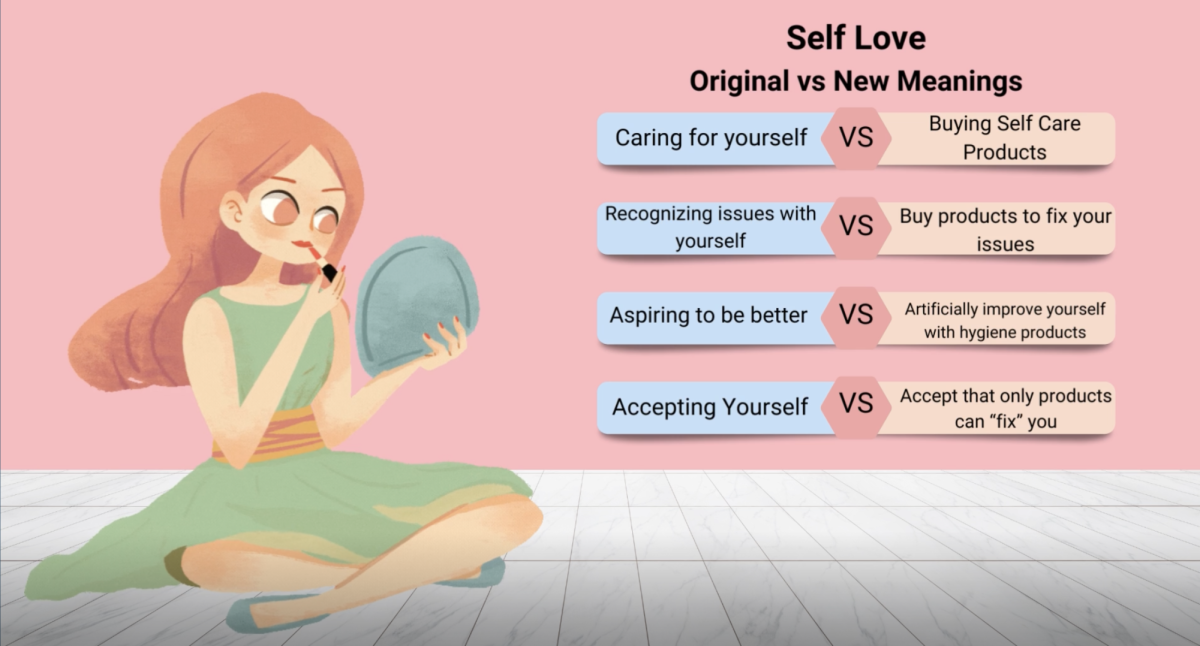The term “Self Love” can mean many things depending on who you ask. The term has existed for decades, and was first coined by Eric Fromm in the 1950’s. Since then, self-love has changed shape quite a bit, starting as a relatively niche concept in the 50’s and progressing to the corporatized and creatively bankrupt term as it is used today, according to google trends.
The inception of the idea that would eventually be called Self Love was discovered by many ancient civilizations. In Ancient Greece it was called Philautia, in Buddhist doctrine there is a practice of inner reflection to show outward love, and a few medieval writers and poets wrote about self love as a means of connecting with the wider universe, according to neoskomos.com. It wasn’t until the 1950’s that the aforementioned Eric Fromm put a concrete name and definition to what we now call self-love. After releasing his book, “The Art of Loving” the term laid dormant in popular culture until the mid 2010’s.
The resurgence of self-love can be attributed to the inclusion and acceptance of Lesbian, Gay, Bisexual, Trans, and Queer people, (LGBTQ+) that was occurring at the time, and self-love became a way to accept oneself as LGBTQ+. However, as with all marketable phrases, self-love was quickly snapped up into consumerist culture to market any product that could improve self image.
Makeup, clothes, even pharmaceutical commercials are branded with the “selflove” moniker, diluting the term with each usage. Every time Alexandria Ocasio-Cortez promotes self-love in Vogue interviews, every time Miley Cyrus sings “Flowers” self-love becomes an increasingly diluted term, according to Time.com. As self-love became a more disposable term, its implied meaning changed with the times.
Now, the term self-love colloquially means to focus on oneself to become the best you can possibly be, as implicitly stated in pop culture and ad campaigns. This meaning, which on the surface sounds positive, has a more sinister undertone, that of self importance above all other factors, essentially egotism. “How you feel about yourself is really important, and encouraging those positive thoughts and self-care,” Counselor, Kristin Longacre said. “Treating yourself like you would treat someone you love.”
This sentiment reflects the genesis of the self-love idea, as the term originally started with a positive connotation. “Too much self-love can turn into egotism and narcissism or being conceited and full of yourself,” Longacre said. This description is more evocative of the modern usage of self-love, with brands and celebrities using self-love as a weapon to sell more products and garner more support from consumers, fueling personal narcissism.
This personal narcissism can lead to a rejection of criticism, a faculty that everyone needs to become their true best self, according to Time.com. The expansion and redefinition of self-love also provide a semi-satisfactory answer as to why Americans face a loneliness epidemic the likes of which we have never seen before.
Self-love, selfworth, and self-acceptance all mainly focus inward, as the prefix would suggest, to the “self”. This can create huge societal issues on a grand scale, as if everyone looks inward to improve themselves, social connections deteriorate as they are neglected and forgotten. But there is light at the end of the depressing tunnel. Connecting with peers can tear down the wall that separates all of us from each other.
Social interaction can cure the metaphorical disease that has been spread by means of consumerist culture and media marketing. The public deserves a better definition of selflove than corporations will give you. Practice self-love as Fromm and Longacre describe it, not how Neutrogena and L’Oréal tell you.



